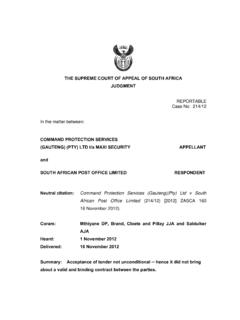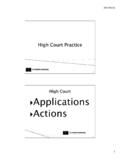Transcription of IN THE HIGH COURT OF SOUTH AFRICA …
1 Reportable IN THE high COURT OF SOUTH AFRICA ( western cape division , cape TOWN) Case No 4502/10 In the matter between: ANNA-MARIE DE VOS N O First Applicant (Curator ad litem to LLEWELLYN STUURMAN) MARIA STUURMAN Second Applicant And MINISTER OF JUSTICE AND CONSTITUTIONAL DEVELOPMENT First Respondent THE DIRECTOR OF PUBLIC PROSECUTIONS ( western cape ) Second Respondent MINISTER OF HEALTH Third Respondent DOWN SYNDROME SOUTH AFRICA First amicus curiae cape MENTAL HEALTH Second amicus curiae And in the matter between: Case No 5825/14 SARAH SNYDERS First Applicant MORNAY CALITZ N O (curator ad litem to PIETER SNYDERS) Second Applicant And MINISTER OF JUSTICE AND CONSTITUTIONAL DEVELOPMENT First Respondent MINISTER OF HEALTH Second Respondent THE DIRECTOR OF PUBLIC PROSECUTIONS ( western cape ) Third Respondent 2 COURT : GRIESEL J Heard: 13 August 2014 Delivered: 5 September 2014 _____ JUDGMENT _____ GRIESEL J: [1] These two applications have been consolidated and were heard together in the light of the similarity in the relief claimed herein as well as the applicable legal principles on which the claims are based.
2 Both applications concern persons, Mr Llewellyn Stuurman and Mr Pieter Snyders respectively, with mental disabilities who find themselves in conflict with the criminal justice system, facing charges of murder and rape respectively. They are represented in these proceedings by their respective mothers as well as the curators ad litem appointed for them by this COURT . [2] The relief sought in both applications is an order declaring s 77(6) (a) of the Criminal Procedure Act, 51 of 1977 ( CPA ) to be un-constitutional, together with ancillary relief. In the Stuurman matter, the attack is confined to s 77(6) (a)(i), whereas the applicants in the Snyders matter are assailing both sub-paragraphs (i) and (ii).1 In a nutshell, the problem concerns the fate of persons who, by reason of mental illness or mental defect, are unfit to be tried.
3 1 The relevant portions of the sub-section are quoted in full in para [9] below. 3 [3] The respondents cited herein, all of whom oppose the relief claimed, are the Minister of Justice and Constitutional Development (as the Department was formerly called), the Minister of Health in the National Government and the Director of Public Prosecutions, western cape ( DPP ). All three respondents were represented before me by Mr Ntsebeza SC, with him Ms Poswa-Lerotholi, while Ms Pillay SC appeared with Ms Karachi for the applicants in the Stuurman matter and Mr Katz SC, with Mr Klopper, appeared for the applicants in the Snyders matter. [4] In addition, two organisations have applied for and have been granted leave to join the application as amici curiae, namely cape Mental Health ( CMH ) and Down Syndrome SOUTH AFRICA ( DSSA ).
4 Both amici align themselves, broadly, with the relief claimed by the applicants herein. Helpful written as well as oral submissions were also submitted to this COURT by Ms Goodman, together with Mr Kelly, on behalf of CMH and Ms Fourie on behalf of DSSA. Legislative fra me work [5] The issues of mental illness and criminal responsibility are regulated in Chapter 13, comprising ss 77 79 of the CPA, headed Accused: Capacity to Understand Proceedings: Mental Illness and Criminal Responsibility . These sections form an integrated unit. 2 2 Du Toit et al, Commentary on the Criminal Procedure Act, 13 1 (Service 51, 2013). 4 [6] Section 77 deals with an accused person s fitness to stand trial. The criterion for an accused s fitness to stand trial, as expressed in s 77(1), is whether the accused by reason of mental illness or mental defect [is] not capable of understanding the proceedings so as to make a proper defence.
5 If it appears to the COURT at any stage in the proceedings that the accused may be unable to understand the proceedings due to a mental illness or defect, the COURT must direct that the accused be referred for observation in terms of s 79 of the [7] Section 78 deals with the situation where the accused is found, by reason of mental illness or mental defect, not to be criminally liable for an act or omission which would otherwise have been punishable as a crime. Hiemstra4 conveniently summarises the difference between ss 77 and 78 by explaining that the sections deal with two questions that can arise, namely the now and the then questions: 1. The accused is suffering from a mental illness the effect of which is that he or she cannot be put on trial: section 77 the now question. In the adjudication of this question the condition of the accused when the conduct in question was committed is not considered.
6 2. Responsibility for the alleged offence cannot be placed at the door of the accused because of his or her mental condition at the time of the conduct: section 78 the then question. According to subsection (1) this is a dual question, namely whether the accused was able to (i) appreciate the wrongfulness of the conduct and (ii) act accordingly. 3 Section 77(1). 4 Albert Kruger Hiemstra s Criminal Procedure (Service 7, May 2014) at 13-3. See also S v Mabena 2007 (1) SACR 482 (SCA) para 12. 5 [8] Although dealing with different situations, there is a close cor-relation between the two sections. Thus, the provisions of ss 77(1) to (4) are reproduced verbatim in ss 78(2) to (5): both sections contemplate an enquiry in terms of s 79, in terms of which an accused person must be assessed by suitably qualified medical experts.
7 The experts must diagnose the mental condition of the accused and report their findings to the COURT . If the experts are unanimous in their findings as to the accused s capacity, and their findings are not contradicted by either the prosecutor or the accused, then the COURT can determine the matter on the basis of their reports without hearing further On the other hand, where their findings are not unanimous or, if unanimous, are disputed by the prosecutor or the accused, the COURT shall determine the matter after hearing evidence .6 [9] When it comes to ss 77(6) and 78(6), the two sections diverge: as noted earlier, the former deals with the now question, whereas the latter deals with the then question. Nonetheless, the similarities continue, because in both situations, the COURT is enjoined to deal with persons suffering from mental illness or mental defect who are charged with the same serious offences.
8 However, the ways in which the COURT may deal with the accused persons differ markedly: in terms of s 77(6), where a COURT finds that an accused is incapable of understanding the proceedings so as to make a proper defence, it is enjoined to follow one of two particular avenues provided for in ss 77(6)(a)(i) and (ii), respectively: 5 Sections 77(2) and 78(3). 6 Sections 77(3) and 78(4). 6 (6)(a) If the COURT which has jurisdiction in terms of section 75 to try the case, finds that the accused is not capable of understanding the proceedings so as to make a proper defence, the COURT may, if it is of the opinion that it is in the interests of the accused, taking into account the nature of the accused s incapacity contemplated in subsection (1), and unless it can be proved on a balance of probabilities that, on the limited evidence available the accused committed the act in question, order that such information or evidence be placed before the COURT as it deems fit so as to determine whether the accused has committed the act in question and the COURT shall direct that the accused (i)
9 In the case of a charge of murder or culpable homicide or rape or compelled rape as contemplated in sections 3 or 4 of the Criminal Law (Sexual Offen-ces and Related Matters) Amendment Act, 2007, respectively, or a charge involving serious violence7 or if the COURT considers it to be necessary in the public interest, where the COURT finds that the accused has committed the act in question, or any other offence involving serious violence, be detained in a psychiatric hospital or a prison pending the decision of a judge in chambers in terms of section 47 of the Mental Health Care Act, 2002.[ MHCA ]8 (ii) where the COURT finds that the accused has committed an offence other than one contemplated in subparagraph (i) or that he or she has not committed any offence (aa) be admitted to and detained in an institution stated in the order as if he or she were an involuntary mental health care user contemplated in section 37 of the Mental Health Care Act, 2002,9 (bb).
10 7 For the sake of brevity, these offences will collectively be referred to hereafter as the listed offences . 8 Section 47(1) of the MHCA Act provides for an application to a Judge in Chambers for the discharge of the State patient and reads: Any of the following persons may apply to a Judge in Chambers for the discharge of a State Patient and then enumerates the various persons, including the State Patient, who may do so. 9 Section 37 of the MHCA provides for the periodic review, annual reports and discharge of in-voluntary mental health care users. In terms of s 37(3) to (6) it is the Health Review Board that can discharge the involuntary mental health care user. 7 and if the COURT so directs after the accused has pleaded to the charge, the accused shall not be entitled under section 106(4) to be acquitted or to be convicted in respect of the charge in question.












